As software developers or business owners, we are all familiar with the concept of native apps. Native apps are applications that are built to run on a particular platform or operating system, such as iOS, Android, Mac, or Windows using popular frameworks like Java, Flutter, React Native, Kotlin, C++, Swift, and Objective-C.
Native apps provide a user experience that is tailored specifically to the device it’s running on, along with optimized performance and access to device features such as the camera, GPS, and more.
According to the latest data from Statista, Google’s Android and Apple’s iOS operating systems have completely dominated the mobile Operating System(OS) market in recent years. In the fourth quarter of 2022, they accounted for a whopping 99.4 percent of the total mobile market. This makes it clear that when it comes to mobile app development, the focus is still firmly on creating native applications for the Android and iOS platforms going into the future.
In this blog post, we’ll explore what native apps are, how they differ from other types of applications, and why you should consider using them for your own business.
Definition of Native Apps
Native apps are applications that are designed to work on a particular platform or device, such as Android, iOS, or a Windows computer. They are downloaded and installed directly onto the device. Native apps are usually the most reliable, efficient and secure option for businesses that need to provide their customers with an app-based experience.
Pros and Cons of Native App Development
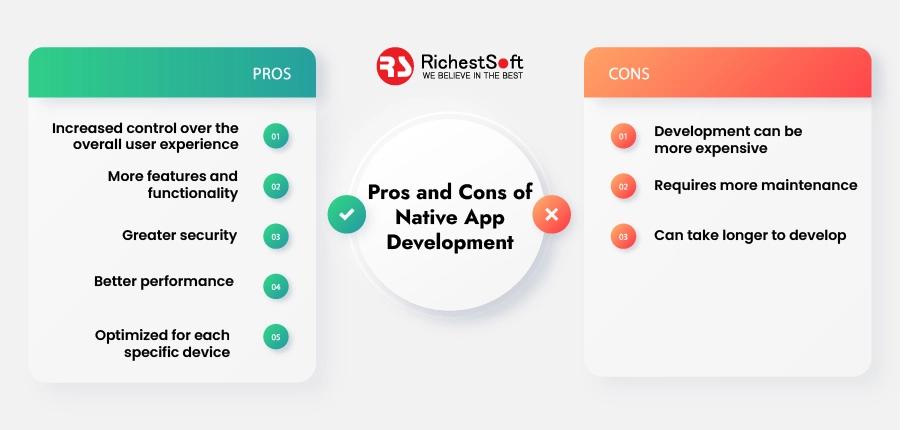
Pros:
• Increased control over the overall user experience
• More features and functionality
• Greater security
• Better performance
• Optimized for each specific device
Cons:
• Development can be more expensive
• Requires more maintenance
• Can take longer to develop
Native apps offer a unique opportunity for companies to create a higher level of engagement with their customers, allowing them to provide a more personalized, tailored experience. That is why native app development is more expensive than web apps. Furthermore, people choose native apps because they are easy to maintain and update, making them an ideal choice for long-term success.
Native App Examples
Native apps are the most popular mobile applications on the market today. From popular games to productivity tools to communication apps, native apps provide users with a fast, reliable, and secure experience.
Here are some of the most popular native apps available today:
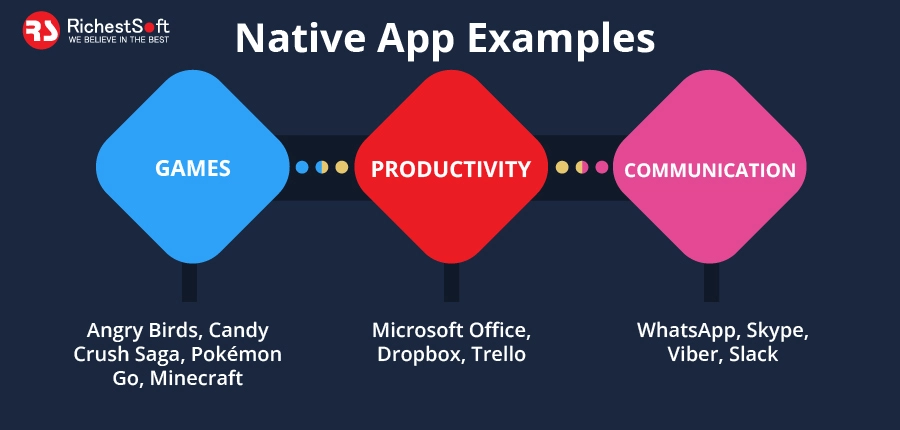
Games: Angry Birds, Candy Crush Saga, Pokémon Go, Minecraft
Productivity: Microsoft Office, Dropbox, Trello
Communication: WhatsApp, Skype, Viber, Slack
Native apps provide an enhanced user experience with faster loading times, smoother animations, and better battery life. With these advantages, it’s no surprise that they are the most popular mobile applications on the market.
Native App Platforms/Frameworks
As a business owner, you may be looking to develop a mobile app for your business, but not sure which frameworks to choose. Native app development offers a wide range of options for developing a high-quality, user-friendly mobile app.
Native app development allows you to create an app specifically tailored to the operating system of your choice. This means, users will have the same user experience on their phones, regardless of the device they use. With native app development, you can take advantage of the various advantages such as device-specific UI, access to device’s other features, and a better user experience.
When it comes to native app development, there are several options available to you. For instance, you can use a cross-platform framework such as React Native, Flutter, and Xamarin, or a native app platform such as Android, iOS, and Windows.
Also Read: Requirements for Developing A Mobile App: An Ultimate Guide
Top 10 Native App Development Frameworks
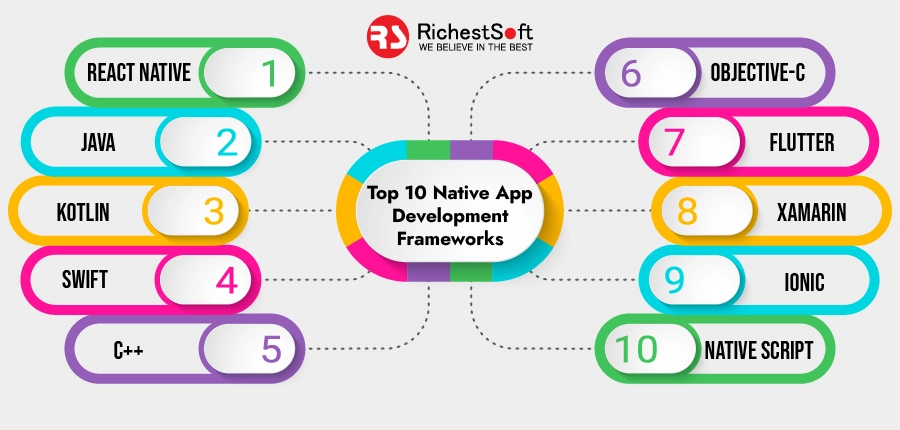
React Native
React Native is a framework developed by Facebook and is based on the popular JavaScript library, React. It allows you to build cross-platform apps with the same code base, making it one of the most popular choices for native app development.
Java
Java is a versatile and powerful programming language that enables developers to create robust, high-performance applications. While Java is not the only language that can be used for native app development, it is a popular choice among developers due to its flexibility and wide range of features.
Kotlin
Kotlin is a JVM based language created by JetBrains. It is a statically typed language that runs on the JVM and can be used to create Android apps. Kotlin is 100% compatible with Java, so you can use all existing Java libraries in your Kotlin code. Kotlin is an open source language that is free to use.
Related Blog: Kotlin vs Java | Which One is Right For You?
Swift
Swift is a powerful and intuitive programming language for macOS, iOS, watchOS, tvOS, and Linux. Swift adopts safe programming patterns and adds modern features to make programming easier, more flexible, and more fun. Swift’s clean syntax is brief yet expressive, and its LLVM compiler infrastructure makes code generation lightning-fast.
C++
C++ is a powerful programming language with a wide range of applications. It is frequently used for developing high-performance applications, such as video games, desktop apps, and scientific software. C++ is also a popular choice for developing cross-platform applications.
Objective-C
As the name might suggest, Objective-C is a language that was created with the sole purpose of developing apps for Apple products. It’s a powerful yet easy to use language that has been around for almost three decades. In that time, it’s become the go-to language for developers who want to create native iOS and macOS apps.
Flutter
Developed by Google, Flutter is an open source framework that allows developers to create apps for Android, iOS, Windows, Mac, Linux, and the web. It uses a powerful and fast programming language called Dart, and it’s easy to learn.
Xamarin
Xamarin is Microsoft’s platform for mobile app development. It supports both iOS and Android, and the code is written in C#. This is a great choice for businesses that need to target both platforms.
Ionic
Ionic is an open source framework for building hybrid mobile apps. It uses HTML5, CSS, JavaScript, and Angular. This framework provides a single code base for both Android and iOS, making it easier to maintain and update.
NativeScript
NativeScript is a framework developed by Progress. It’s based on JavaScript, and it allows you to build native apps for all platforms. This is a great choice for businesses that need to target multiple platforms.
Choosing the right native app development framework for your business can be a difficult task. However, all of the above frameworks are excellent choices and can make the development process much easier. With the right framework in place, you can create an app that will provide an excellent user experience and will be used by a large number of users.
Native App Platform
Android and iOS are two of the most popular native app platforms. Android is an open-source platform developed by Google, while iOS is Apple’s proprietary platform. Both Android and iOS offer a range of features, such as access to the device’s other features, a range of UI components, and native performance.
Native app development can be a great choice for developing a high-quality, user-friendly mobile app. There are a range of platforms and frameworks available, such as React Native, Flutter, Xamarin, Android, and iOS, that offer different advantages and features. So, it is important to choose the right platform or framework for your app, as it will determine the success of your app.
Features that Makes a Native App
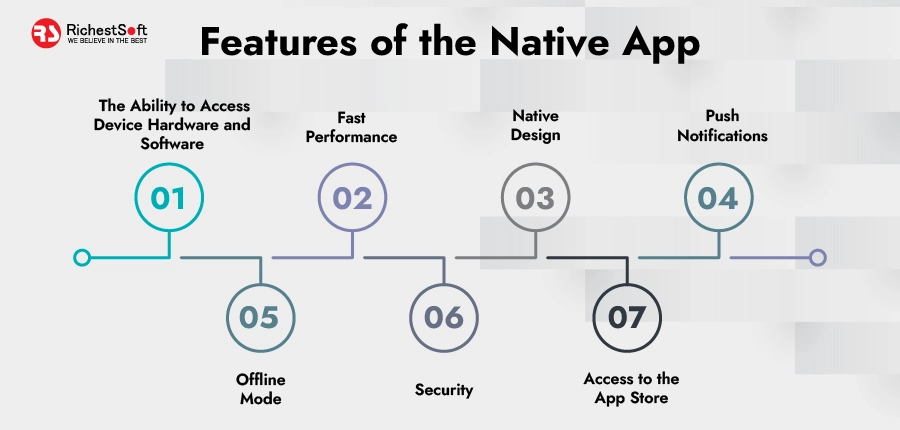
As a business owner, you are constantly looking for ways to improve customer engagement and boost your bottom line. From website design to social media campaigns, there are a number of ways to reach potential customers. However, one of the most powerful tools in your arsenal is the native app.
A native app is a mobile application that is specifically designed to be used on the platform it was created for. This means that you can take advantage of unique features and functionality offered by the platform, such as touch screens, location-based services, and notifications, to create an engaging experience for your users.
When you choose to develop a native app, you’ll benefit from a number of features that can help you create an engaging user experience. Here are some of the features that make a native app a powerful choice for businesses:
1. The ability to access device hardware and software: This is one of the main advantages of native apps, as they can access the full range of features offered by a device. This includes things like the camera, GPS, contacts list, and more.
2. Fast Performance: Native apps are designed to run quickly and efficiently on the platform they were designed for. This ensures a smooth experience for your users and helps your app stand out from the competition.
3. Native Design: Native apps are designed with the device’s native UI components in mind. This helps create a consistent user experience across platforms, and ensures that users can quickly and easily interact with your app.
4. Push Notifications: Push notifications are a powerful way to keep your users engaged. With native apps, you can easily send notifications to alert users about important updates or offers.
5. Offline Mode: Native apps can work even when users are offline, allowing them to access content or features even when they have no Internet connection.
6. Security: Native apps offer a high degree of security, as they’re designed to run in a secure environment. This helps ensure user data is kept safe and secure.
7. Access to the app store: Native apps can be published on the official app stores, which makes it easier for users to find them. It also helps with security and privacy, as only approved apps are allowed on these stores.
These are just some of the features that make a native app an excellent choice for businesses. If you’re looking to take your customer engagement to the next level, consider investing in native app development. It can help you create an engaging experience for your users and boost your bottom line.
Advantages of Native Apps
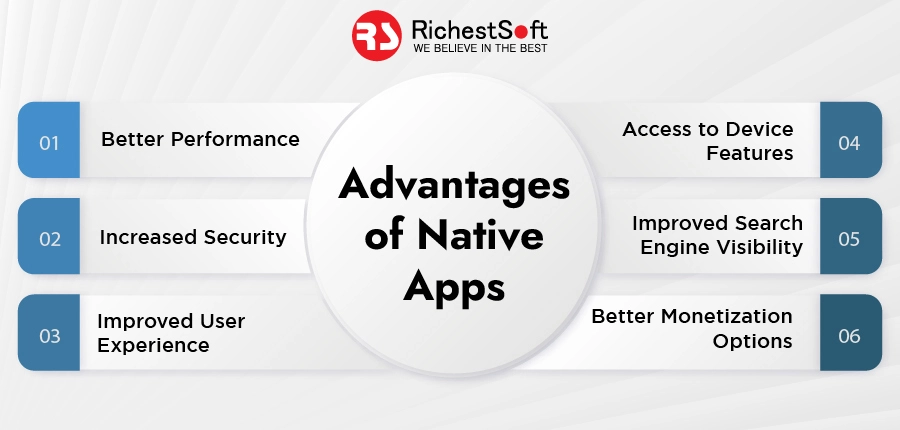
The advantages of a Native App include:
1. Better performance: Native Apps are designed to work with specific operating systems, taking advantage of every device’s hardware and software capabilities. This allows for faster and smoother performance.
2. Increased security: Native Apps use standard security protocols and have access to device-level hardware, making them more secure than web-based apps.
3. Improved user experience: Native Apps are designed for specific devices and platforms, so they are more user-friendly and intuitive. This makes them easier to use and provides a more enjoyable user experience.
4. Access to device features: Native Apps can access device features such as the camera, GPS, and accelerometer, allowing them to offer more features and functionalities.
5. Improved search engine visibility: Native Apps are easier for search engines to find, leading to improved visibility and access.
6. Better monetization options: Native Apps can be better monetized than web-based apps, as they can offer features such as in-app purchases and subscriptions.
There are a Few Key Factors to Consider When Choosing the Right Native App Development Company for Your Project.
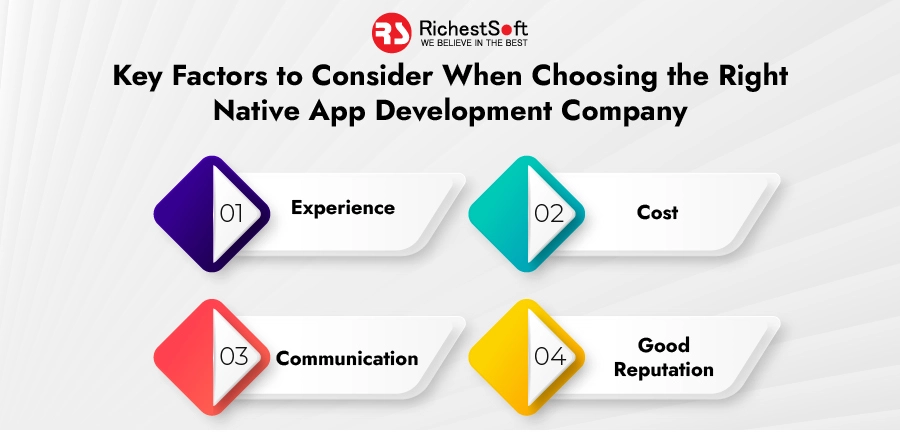
✅ The first is experience.
You’ll want to choose a company that has a proven track record in developing successful native apps. Ask for references and case studies, and take the time to research the company’s past projects.
✅ The second factor is cost.
Native app development can be expensive, so you’ll need to find a company that fits within your budget. Get quotes from several companies and compare their rates.
✅ The third factor is communication.
It’s important that you find a company that you can communicate effectively with throughout the development process. Make sure they offer regular updates and are available to answer any questions you have.
✅ Choose a company that has a good reputation.
Read online reviews on websites like Clutch and Trustpilot, and ask for referrals from people who have used their services before. This will help you get an idea of the quality of work they provide and how satisfied other customers have been with their experience.
By considering these four factors, you can narrow down your options and find the right native app development company for your project.
What Makes Richestsoft the Best Choice for Native App Development?
Richestsoft is the best choice for native app development due to its comprehensive range of services, highly experienced team of developers, and cutting-edge technology. Their services include designing, developing, integrating, and testing native apps for various platforms, such as iOS and Android.
The team of developers have vast experience in developing efficient native apps that provide a seamless user experience. Furthermore, they utilize the latest technologies to ensure the highest quality of apps. As a result, Richestsoft is the best choice for native app development.
FAQs
1. What is a Native App development?
Native app development is the process of creating an application that runs on a specific platform, such as iOS or Android. Native apps are developed using the platform’s language and tools, so they can access the device’s features and built-in APIs. This allows for a more optimized and tailored user experience.
2. What is the difference between a mobile app and a native app?
A mobile app is an application that is designed to be used on a mobile device such as a smartphone or tablet. A native app is a mobile application that is specifically designed to run on a mobile device and is usually downloaded from an app store. Native apps are usually more complex and feature-rich than mobile apps and provide a better user experience. Native apps are also more secure and offer better performance than mobile apps.
3. What are the benefits of a Native App?
The benefits of a native app are numerous. Native apps are typically faster, more reliable, and more user-friendly than web apps. They are also more secure and can access device features like cameras and GPS, as well as offer offline capabilities. Native apps also tend to be more discoverable and easier to find in app stores, and they can take advantage of device hardware like accelerometers and gyroscopes. Lastly, native apps offer more control to the developer and can be more tailored to the user’s device.
4. What are the costs involved in developing a Native App?
The cost of developing a native app can depend on many factors, including the complexity and scope of the project. Generally, this involves any fees related to design and development, software licensing, hosting and maintenance, as well as other expenses. Usually, the budget lies between $30,000 and $170,000. It is important to also keep in mind that additional charges may be incurred for features such as analytics, advertising and push notifications. The price for submitting the app to either App Store or Google Play store should accordingly be taken into consideration when estimating the total figure.
Conclusion
The native app provides a powerful, tailored user experience and is especially well-suited for complex software solutions. It gives developers access to the full power of underlying hardware and the freedom to be creative with their design. Of course, this comes at a cost – they are more expensive than web apps but offer unparalleled performance, security and reliability.
So if you’re looking for an ultimate mobile experience that requires no internet connection or maintenance, then developing a native application should definitely be on your list of options.
 +1 315 210 4488
+1 315 210 4488 +91 798 618 8377
+91 798 618 8377


